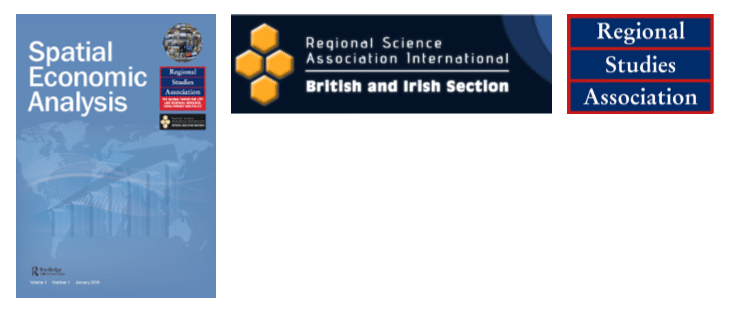
Spatial Economic Analysis is a pioneering economics journal dedicated to the development of theory and methods in spatial economics, published quarterly by two of the world’s leading learned societies in the analysis of spatial economics, the Regional Studies Association and the British and Irish Section of the Regional Science Association International.
The journal takes regional economics as its focus, is targeted at international audiences and has achieved an SSCI listing with an impact factor of 1.231 (2017). It is a leading outlet for high quality research from international contributors in the field of regional economic analysis. See the journal website for more details: https://rsa.tandfonline.com/toc/rsea20/current
Three long-standing Co-Editors (who support the Editor in Chief) have come to the end of their terms, and replacement Co-Editors are sought for five-year editorial terms. A new post of Digital Media Co-Editor is also being made available at the same time.
Co-Editors of Spatial Economic Analysis are expected to:
- Support the peer review process by selecting referees on appropriate manuscripts (assigned to them by the Editor in Chief) and making recommendations to the Editor in Chief based on referee reports. The peer review process is double blind on all submitted manuscripts.
- Use ScholarOne Manuscripts, the online submissions tracking system, to assist in the editorial process.
- Comment on and contribute to the editorials, which are written by the Editor in Chief for publication in each general issue (not for special issues).
- Continue the development of the journal and in particular to encourage submissions and special issues from leading writers in the field.
The Digital Media Co-Editor will have a much lighter peer review load (as above) and will be additionally expected to:
- Develop a digital media strategy in collaboration with the two Associations, publisher and editorial team to disseminate journal content and engage with readers and followers.
- Set-up and manage social media accounts ensuring regular content in line with the agreed strategy.
Under the current arrangements, the Regional Studies Association covers the cost of the employment of an Editorial Assistant. The publisher handles production. It also markets the journal to the Regional Studies Association membership, the Regional Science Association British and Irish Section membership and to the journal subscriber base. Spatial Economic Analysis is available as part of a bundle with the RSA journals Regional Studies; Territory, Politics, Governance and Area Development and Policy and also for separate subscription.
Candidates are invited to prepare the following:
Co-Editor:
- A brief editorial manifesto outlining their intentions for the safeguarding and further development of the academic excellence, relevance and scope of Spatial Economic Analysis;
- An indication of host institution support; and
- CV.
Digital Media Co-Editor:
- A brief editorial manifesto outlining how the journal’s digital and especially social media presence might be developed under their stewardship;
- An indication of host institution support; and
- CV.
The selection of the new Co-Editors will be made by the Regional Studies Association and Regional Science Association British and Irish Section in the light of recommendations from the Regional Studies Association’s Publications Committee. The posts are for commencement as soon as possible after the decision has been made.
If you have any questions, please do not hesitate to get in touch:
Sally Hardy, Chief Executive, Regional Studies Association – sally.hardy@regionalstudies.org
Paul Elhorst, Editor in Chief – j.p.elhorst@rug.nl
Please email your manifesto and supporting documentation by Friday 17th May 2019, 4pm BST to Sally Hardy (sally.hardy@regionalstudies.org) at the Regional Studies Association office.
Call for SEA Editors